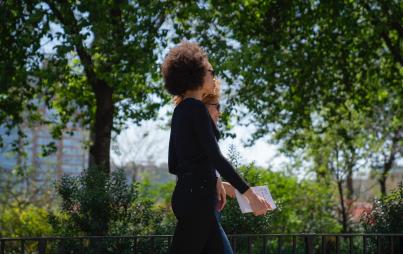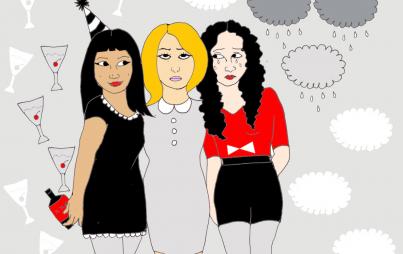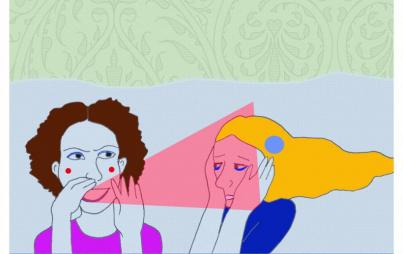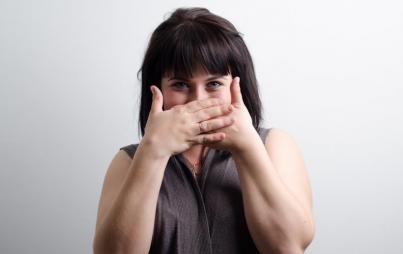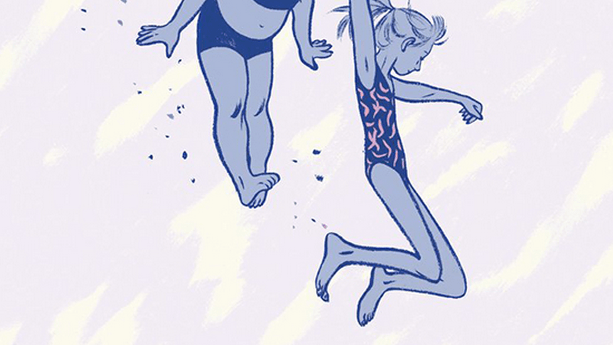
All photos courtesy of Jillian Tamaki and Mariko Tamaki via Paste Magazine
The graphic novel This One Summer by Jillian Tamaki and Mariko Tamaki received the Printz award as the best young adult book of the year. It also—more surprisingly—won the Caldecott honor as the most distinguished American picture book published for children in 2014.
It's a rather unusual selection for Caldecott—not only marking the first graphic novel to ever receive the award—but offering up a story that isn't exactly a children's tale.

This One Summer is, in truth, nominally about kids. The main character is tween Rose; the book follows her and her year-and-a-half younger friend Windy through the summer holiday. And while the book is told from Rose's perspective, the real plot of the graphic novel focuses on older folks—Rose's mother had a miscarriage a year before, and she and Rose's dad are still struggling with disappointment and grief. Meanwhile a local teen, Jenny, is pregnant; the father, local convenience store clerk Dud, refuses to acknowledge her or deal with the implications. Rose has a crush on Dud, and is obviously emotionally affected by her mother's sadness, but the story isn't about her. Instead, as Windy says of the whirlwind surrounding them, "It's like a TV show"—and Rose and Windy are the watchers.
If This One Summer is a kid's book, it's only because the reader is positioned as a child, watching the adult drama unfold.
It's not a contradiction for children to watch adult shows; rather, the Tamakis suggest that a big part of childhood is watching adult drama and trying to figure it out, and to figure out where you, as a kid, fit inside it. Mariko's inky languid black and white art is detailed and sumptuous; it slows things down to give you time to look.

Thus, on Jenny's first appearance at the convenience store, the comic gives you a full-length look at her, head tilted flirtatiously, while (a panel or so on) Rose's eyes are all the way open, nervous, curious, fascinated, shy. Or after Rose's dad leaves the summer house for a few days, and Rose knocks on her mom's door—"Um are we having dinner? Mom?"—there's no answer. In the next panel Rose is gone, leaving just the door to stare at, blank and quiet, on the page and still, presumably, in Rose's mind.
In addition to watching the adults around them, Rose and Windy also start watching adult media—specifically horror films. Rose uses renting videos as an excuse to interact (briefly) with Dud, and as a way to (theoretically) impress him. She and Windy end up renting a series of horror classics: Texas Chain Saw Massacre, Jaws, and various other slashers. At one point, to escape the carnage on screen, the girls hide under a blanket and distract each other by speculating about oral sex (they overheard Jennie and her friends discussing blow-jobs earlier). Rose and Windy are trying on different bits of adulthood while hiding from the violence to peep out at the sex; after all, it's Rose's crush who leads her to watch the horror films in the first place.
If violence and sex get tangled up, so do desire and identity. Rose's crush on the Dud is in part sexual attraction; she thinks he's cute, and blushes furiously. When he casually nicknames her "Blondie," her interest in him plays out not just as wanting him, but as wanting to be him. She speculates about having a house with him and a kid some day, but she also rents those horror films, slipping into that teen boy demographic to see what it's like. As the story develops and Rose confronts her conflict with Jenny, she takes Dud's side, adopting his hostility and misogyny.
"I bet she was cheating. So typical," she tells Windy. "All the girls here are sluts." Windy points out, accurately, that "that's kind of sexist," but it's also what the Dud seems to think, or wants to think. When Rose sneers at all the other girls, her eyes are half-lidded; she's trying to be self-consciously sophisticated and adult. She may be jealous of Dud, but she's also into masquerading as a grown up like Dud; she watches him, and everyone else, to see how to be an adult, or what kind of adult she wants to be.

If you're a kid, you've been watching this lovingly detailed story about summer trembling on the verge of adulthood. If you're an adult, you've been watching this lovingly detailed story about a summer past, floating back there before adulthood encompassed you.
And this is the promise of the young adult genre; young adult books give kids the chance to be adults, and adults the chance to be kids. There's an exhilaration in that, as everybody gets to imagine themselves as everyone else.
There's also some melancholy. Adults and children are joined in watching each other, but the watching is also a separation—the pleasant longing, and the thrill of imagination, depends on distance. It makes sense that This One Summer received the Caldecott not because it's for children, but because it depends on the idea that children are separate, over there, watching and reading. (And getting their own separate prizes.)

